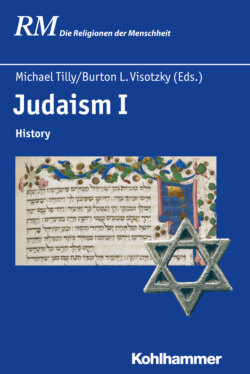Читать книгу Judaism I - Группа авторов - Страница 28
На сайте Литреса книга снята с продажи.
14 Jewish Literature in the Hellenistic-Roman Period (350 B.C.E. –150 C.E.)
ОглавлениеDr. Michael Tilly of Eberhard Karls University of Tübingen surveys Jewish literature from the close of the Hebrew Bible up to rabbinic literature. Koine Greek was the lingua franca throughout the eastern Mediterranean. Jewish writings from Hellenistic-Roman times comprise different genres, styles, and linguistic levels. These texts were composed primarily in the three centers of ancient Judaism: the Land of Israel, Egypt, and Babylonia (Iraq). The rabbis did not hand down Hellenistic-Jewish literature. Rather, Greek Jewish literature was handed down, translated, revised, and supplemented exclusively by Christianity.
Historical and legendary texts are considered, such as: 3 Ezra, 1–3 Maccabees, Judith, Greek Esther, the Greek Daniel traditions: Susanna; Bel and the Dragon; Prayer of Azariah; the three men in the fiery furnace. Dr. Tilly also surveys: the Paraleipomena Jeremiou and Vitae Prophetarum, Hellenistic-Jewish historians, whose work is often fragmentary including Eupolemus, Artapanos, and the works in Hecataeus of Abdera.
Dr. Tilly turns next to teachings in narrative form such as: Tobit, the Letter of Aristeas, which recounts the legend of the commission and translation of the LXX, the Book of Jubilees, Ascensio Isaiae, as well as a Life of Adam and Eve (in Latin) or Apocalypse of Moses (Greek). The Liber Antiquitatum Biblicarum was falsely attributed to Philo in the Middle Ages. The Hellenistic novel Joseph and Asenath is also reviewed.
Other works such as the Teachings of Ben Sirach, the Wisdom of Solomon, Book of Baruch, Epistle of Jeremiah, 4 Maccabees, the Testament of the Twelve Patriarchs, and the Testament of Job are included. The thoroughness of the survey is indicated by Dr. Tilly’s inclusion of the Hellenistic-Jewish exegetes Demetrios, Aristobulus, and another exegete called Aristeas (not the one already mentioned).
A section follows on poetry: Psalm 151, the Psalms of Solomon, Pseudo-Phocylides, and Ezekiel the Tragedian’s Exagogé. The chapter continues with Greek Apocalyptic works such as the Greek and the Syriac Apocalypses of Baruch, the Ascension of Moses, 4 Ezra, the Apocalypse of Abraham, 1–2 Enoch, and the Sibylline Oracles. Dr. Tilly briefly surveys the various non-biblical Dead Sea Scrolls, before concluding with the works of Philo and Josephus.
